|
|
|
Sort Order |
|
|
|
Items / Page
|
|
|
|
|
|
|
| Srl | Item |
| 1 |
ID:
149175
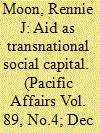

|
|
|
|
|
| Summary/Abstract |
In this paper, we explore a new framework for higher education official development assistance (ODA) with a focus on the transnational bridging benefits of social capital. We first explain why and how a transnational social capital approach can improve the current focus on human resources and local bridges in higher education development. We then illustrate its merits by examining, 1) the transnational bridging potential of social capital formed by foreign students currently studying in Korea; and 2) the actual transnational social capital contributions of foreign professionals who returned home after completing a Korean higher education ODA program. In doing so, we direct particular attention to the value of transnational social capital in promoting development cooperation and public diplomacy. We conclude by discussing how our approach has conceptual importance and practical implications for development cooperation in higher education.
|
|
|
|
|
|
|
|
|
|
|
|
|
|
|
|
| 2 |
ID:
154479
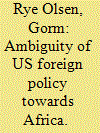

|
|
|
|
|
| Summary/Abstract |
Abstract
Since 9/11, the American policy towards Africa has been strongly influenced by national security interests and in particular by the fight against international terrorism and Islamic radicalisation. Traditionally, the American Africa policy has been the result of bureaucratic policymaking with the Pentagon and the State Department playing prominent roles. The paper argues that in the current century, evangelical Christian lobby groups have gained increasing influence on policymaking on Africa. Because policymaking has been influenced by a number of different actors, the American Africa policy may appear incoherent and ambiguous if judged narrowly on the expectation that it only aims to take care of US national security concerns and economic self-interests. The paper concludes that Africa was important to the United States during the presidencies of George W. Bush and Barack Obama because of the combination of strong security interests and strong domestic lobby groups that have pressured to place Africa on the US foreign policy agenda.
|
|
|
|
|
|
|
|
|
|
|
|
|
|
|
|
| 3 |
ID:
178419
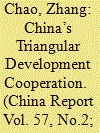

|
|
|
|
|
| Summary/Abstract |
Triangular development cooperation (TDC) is an increasingly popular modality in the aid field. It is seen to have both huge potential and limits. As the largest emerging donor, China’s participation in TDC has been put under the spotlight. This article proposes a working definition of TDC focused on the type of resources transferred, and establishes a data set on the projects that China was involved in, from 2005 to 2016. Moreover, it investigates China’s perception of the TDC by analysing its official publications. It finds that (a) China holds an equivocal understanding of the TDC concept; (b) although China has been rhetorically stressing the importance of TDC, few real actions have been taken; (c) China prefers international organisations in TDC instead of traditional donors; and (d) like other actors, most of China’s TDC projects are recorded in non-economic sectors. At the moment, China remains cautious regarding the modality. But considering the growing volume of Chinese aid and its visibility, a more proactive stance on TDC might better serve Chinese interests.
|
|
|
|
|
|
|
|
|
|
|
|
|
|
|
|
| 4 |
ID:
142025
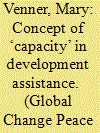

|
|
|
|
|
| Summary/Abstract |
The idea of capacity development has become ubiquitous in discussions of development assistance: a lack of capacity in developing countries is frequently identified as the main obstacle to development and building ‘capacity’ is seen as the most important output of development assistance. The terms ‘capacity development’ and ‘capacity building’ are, however, relatively new in development assistance discourse, having only come into frequent use in the last two decades. This paper examines the history and different uses of the concept of capacity in development assistance literature, tracing its origins and rise in popularity. Although a large amount of material has been produced on the topic there is no clear agreement on what it means, with a range of interpretations used by different authors and in different contexts. The more expansive and ambitious approaches promoted by some development organizations have a number of theoretical and practical difficulties and it is argued that the wide and imprecise use of the term has undermined its usefulness.
|
|
|
|
|
|
|
|
|
|
|
|
|
|
|
|
| 5 |
ID:
153724
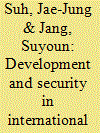

|
|
|
|
|
| Summary/Abstract |
In this paper, we contend that the nexus of security and development lies in the crux of challenges confronting human security and aid failure in North Korea. We first review academic and policy discourses concerning the security-development nexus. We then analyse how the nexus works out its logic in North Korea by exploring how insecurity and underdevelopment have fed into each other, producing a vicious cycle that complicates efforts to address human security in North Korea. In the third and main section, we examine the ways in which South Korea, the USA and the EU provided for assistance to North Korea from 1995 to 2012 at national and international policy levels. We analyse their approaches to international aid and identify differences and commonalities in them so as to better understand how aid giving exacerbates or mitigates the insecurity/underdevelopment and then impacts on the development-security nexus. We finally conclude with a consideration of various strategies to help overcome the dual challenges of underdevelopment and insecurity that besiege North Korea.
|
|
|
|
|
|
|
|
|
|
|
|
|
|
|
|
| 6 |
ID:
137251
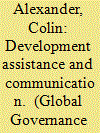

|
|
|
|
|
| Summary/Abstract |
This article argues that international development assistance projects are an ideal way for governments to communicate social values to international audiences and also to consolidate support or seek legitimacy from its domestic public. The case study for this article is the Taiwan International Cooperation and Development Fund. The text argues that this organization should sit at the forefront of the Taiwan government's communications strategy because of recent trends in political communications and also circumstances specific to Taiwan's domestic and international political situation. The research found that the ICDF has taken on more political communications responsibilities in recent years as a result of changes in Taiwan's international political circumstances and the evolution of a democratic society at home.
|
|
|
|
|
|
|
|
|
|
|
|
|
|
|
|
| 7 |
ID:
140333
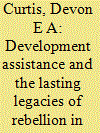

|
|
|
|
|
| Summary/Abstract |
Rwanda and Burundi have both emerged from civil wars over the past 20 years and foreign donors have provided significant contributions to post-conflict reconstruction and development in the two countries. Yet, although Rwanda and Burundi share several important characteristics, their post-conflict social, political and economic trajectories have been different. This article argues that the nature of the ruling parties in Rwanda and Burundi is key to understanding the countries’ relationships with donors. Rather than seeing aid as an exogenous factor, causing particular development outcomes, it shows how local party elites exert considerable agency over the aid relationship. This agency is influenced by a number of different local contextual factors, including how the parties were established, how they evolved and the ways in which their civil wars ended. Thus, the article provides an analysis of how local context matters in understanding donor–recipient aid relationships, and how the ruling party in Rwanda (the RPF) and in Burundi (the CNDD–FDD) emerged from their respective conflicts with different relationships with international donors.
|
|
|
|
|
|
|
|
|
|
|
|
|
|
|
|
| 8 |
ID:
152907
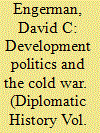

|
|
|
|
|
| Summary/Abstract |
Development Politics and the Cold War’ analyzes history of development assistance during the Cold War, focusing especially on superpower aid to India for the three decades after independence in 1947. It examines development as a rhetorical strategy that allowed groups in both donor and recipient nations to make claims upon others. It also calls for moving beyond “development talk” to examine the practice of development. And finally it shows how development assistance – undertaken in the name of building economic self-sufficiency, ultimately undercut the governability of recipient nations.
|
|
|
|
|
|
|
|
|
|
|
|
|
|
|
|
| 9 |
ID:
071712
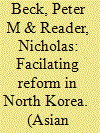

|
|
|
|
|
| Publication |
2005.
|
| Summary/Abstract |
Despite the continuing nuclear confrontation between North Korea and the world, the North is undergoing the most profound economic changes since the founding of the state. The international community can improve North Korea's chances of making a successful transition by first taking advantage of the new opportunities to train North Koreans in financial, technical, and market economic skills. Additionally, the international community can address infrastructural constraints, and undertake comprehensive needs assessments. North Korea will not and should not receive significant international development assistance until it gives up its nuclear weapons, but increasing knowledge about the economy will improve the prospect that any deal reached on the nuclear issue will lead to transformation of the economy.
|
|
|
|
|
|
|
|
|
|
|
|
|
|
|
|
| 10 |
ID:
108145
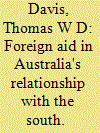

|
|
|
|
|
| Publication |
2011.
|
| Summary/Abstract |
In identifying the determinants of Australia's foreign aid relationship with developing countries (sometimes labelled 'the South'), this article examines the institutional history of official Australian development assistance since the Second World War. Several, often competing, narratives are delineated. These include: an ongoing questioning within the aid 'policy community', such as it is, of the purpose of foreign aid and the nature of its relationship to foreign policy; bureaucratic contestation over access to foreign aid resources; the desire of Australian foreign aid decision-makers to ensure their control, increasingly via managerialist methods, of aid delivery; and an avoidance by decision-makers of viewing the South as a politically relevant entity. Taken together, these narratives portray an aid programme that has become more 'professionalised' over time, but which finds itself institutionally inhibited from engaging meaningfully with the political nature of international development relationships.
|
|
|
|
|
|
|
|
|
|
|
|
|
|
|
|
| 11 |
ID:
124583
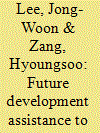

|
|
|
|
|
| Publication |
2013.
|
| Summary/Abstract |
Purpose-This article explores multilateral engagement in the economic rehabilitation of North Korea, with particular focus on the establishment of special trust funds.
Design/methodology/approach-The study consists of an analysis of international assistance to North Korea that addresses policy measures for improving the quality of aid delivery. Conceptual and empirical issues around multi-donor trust funds (MDTFs) are explored by conducting an examination of the role of aid coordination, management practices in multilateral aid, and the potential benefits of trust funds.
Findings-The setting up of trust funds is a possible option for resource mobilization and aid coordination in the provision of development assistance to North Korea. Given the potential benefits of such an aid modality, the creation of one or more MDTFs as a means of facilitating the denuclearization process on the Korean Peninsula could help strengthen relations between Pyongyang and the international donor community. In drawing attention to issues around the administrative structure of the MDTF, this article proposes that international donors establish a North Korea Development Assistance Group (NKDAG) as the principal trust fund governing body.
Originality/value-This is the first policy-oriented study detailing the possible establishment of MDTFs in the North Korean context. The suggestions of the article could contribute to efforts of the international community to improve the transparency and effectiveness of its aid contribution to North Korea.
|
|
|
|
|
|
|
|
|
|
|
|
|
|
|
|
| 12 |
ID:
140805
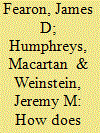

|
|
|
|
|
| Summary/Abstract |
Social cooperation is critical to a wide variety of political and economic outcomes. For this reason, international donors have embraced interventions designed to strengthen the ability of communities to solve collective-action problems, especially in post-conflict settings. We exploit the random assignment of a development program in Liberia to assess the effects of such interventions. Using a matching funds experiment we find evidence that these interventions can alter cooperation capacity. However, we observe effects only in communities in which, by design, both men and women faced the collective action challenge. Focusing on mechanisms, we find evidence that program effects worked through improvements in mobilization capacity that may have enhanced communities’ ability to coordinate to solve mixed gender problems. These gains did not operate in areas where only women took part in the matching funds experiment, possibly because they could rely on traditional institutions unaffected by the external intervention. The combined evidence suggests that the impact of donor interventions designed to enhance cooperation can depend critically on the kinds of social dilemmas that communities face, and the flexibility they have in determining who should solve them.
|
|
|
|
|
|
|
|
|
|
|
|
|
|
|
|
| 13 |
ID:
125978
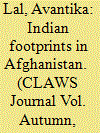

|
|
|
| 14 |
ID:
118659
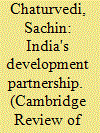

|
|
|
|
|
| Publication |
2012.
|
| Summary/Abstract |
This article examines the emerging trends in India's role as a provider of development assistance to the other developing countries of the global South. Though India has diversified the regional focus and has multiplied the quantum of development assistance, there remain several challenges at various levels. The expectations from the development partners have gone up but is India prepared with the institutional frameworks that would be required to administer the desired scale of response? Is there enough preparedness to undertake impact assessment? This article attempts to address some of these issues.
|
|
|
|
|
|
|
|
|
|
|
|
|
|
|
|
| 15 |
ID:
173905
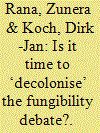

|
|
|
|
|
| Summary/Abstract |
Recent literature has established that development assistance is often fungible and that this is undesirable. In line with current efforts to ‘decolonise development studies’, we critically reflect on the underlying assumptions of this line of thinking. We establish a framework that differentiates between potential positive and negative fungibility. We hypothesise that recipient governments can redirect their own funds and achieve positive fungibility, if (1) the marginal value added in the alternative target sector/region is higher; (2) equity concerns are adequately addressed when other sectors/regions are supported; and (3) temporal delay helps to cushion instability of aid flows. There are indications that this positive fungibility might be quite prevalent. Future fungibility research should therefore no longer assume that fungibility is in itself undesirable.
|
|
|
|
|
|
|
|
|
|
|
|
|
|
|
|
| 16 |
ID:
189314
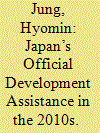

|
|
|
|
|
| Summary/Abstract |
Japanese aid has been continuously criticized as its modalities are focused on economic infrastructure via loans. However, support for economic growth and infrastructure has become more important due to the growing influence of recipient needs and emerging donors. Accordingly, Japan’s perception and implementation of its aid in the changing international regime in the 2010s are a salient factor. This study clarifies the common and different features between the official development assistance before the 1990s and the 2010s to identify which characteristics “returned” from the “Japan model” in the past. The domestic background and factors were examined to explain the alteration concentrated on the meaning of aid in the Abe administration’s policy directions and domestic actors. The results indicate the aid modalities in the 2010s are similar to the aid in the 1980s in some aspects, putting emphasis on economic growth, infrastructure, and cooperation with private sectors. But “quality growth” came into the slogan in the 2010s, as Japan is not the largest donor anymore. The Prime minister’s office (Kantei) led the aid policy as a part of priority policy “Abenomics” to support the prime minister in the 2010s, while collaborations among Liberal Democratic Party members, bureaucrats, and private actors led the aid policy in the 1980s.
|
|
|
|
|
|
|
|
|
|
|
|
|
|
|
|
| 17 |
ID:
120721
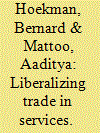

|
|
|
|
|
| Publication |
2013.
|
| Summary/Abstract |
Abstract Liberalization of trade and investment in services through trade agreements has progressed less than trade in goods. We review the limited progress achieved to date in the WTO and major regional agreements on services and possible explanations why trade agreements have not been more effective at integrating the services markets of participating countries. We argue that the prospects for both services liberalization and welfare-enhancing regulatory reform in the context of trade agreements can be enhanced through mechanisms that enhance transparency, dialogue and cooperation between regulators, trade officials and stakeholders.
|
|
|
|
|
|
|
|
|
|
|
|
|
|
|
|
| 18 |
ID:
099817
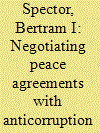

|
|
|
|
|
| Publication |
2010.
|
| Summary/Abstract |
Peace agreements that end internal conflicts are most likely to be sustainable when they include negotiated provisions that resolve corruption and governance abuses that were among the initiating causes of the conflicts. A four-staged process appears to be an underlying theme for the post-conflict period: essential to achieving effective results: ceasefire negotiations, negotiations over future governance and the reestablishment of integrity to government, implementation of the negotiated agreements with the support of development assistance, and continuing dialogue through post-agreement negotiations. Six recent cases of peace negotiation and their implementation are analyzed to yield lessons and recommendations for diplomatic and international development analysts and practitioners. In particular, the role of development assistance is considered both as an impetus to agreement and as an essential stimulant of the post-agreement period.
|
|
|
|
|
|
|
|
|
|
|
|
|
|
|
|
| 19 |
ID:
075379
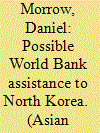

|
|
|
|
|
| Publication |
2006.
|
| Summary/Abstract |
Accepting the DPRK as a member of the World Bank would require the political support of most of the Bank's member governments, and this would become possible only if there is a successful resolution of the Six-Party Talks. The amount of financial assistance from the Bank would then depend on how seriously the DPRK pursues a transition to a more open and market-oriented economy, but in any case the Bank's financial assistance would be small compared to the DPRK's needs and to the potential assistance from bilateral sources. Nevertheless, the World Bank's policy advice and its potential role in coordinating and catalyzing other assistance could be important for North Korean economic development. The prospects for quickly launching a constructive relationship between the DPRK and the World Bank following a successful conclusion of the Six-Party Talks would be enhanced by advanced preparation on both sides. In particular, the DPRK should begin to articulate its own strategy for economic transition.
|
|
|
|
|
|
|
|
|
|
|
|
|
|
|
|
| 20 |
ID:
178009
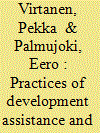

|
|
|
|
|
| Summary/Abstract |
This paper studies how the practices of climate change governance and development assistance have reshaped the Reducing Emissions from Deforestation and Forest Degradation (REDD) process in Mozambique. We look at how the original goals of the Mozambican REDD+ strategy changed in the interplay of different governance-related practices, both those originating locally and nationally, and those coming from international organisations. The paper is based on the frameworks of multilevel governance and practice theory. We identify six combinations of practices that are relevant in the REDD+ programmes and projects. Three of them are incorporated in the general idea of sustainability, including practices of promoting environmental conservation, economic growth and social justice/development, while the remaining three practices are connected to climate-mitigation practices, for which the frame is defined in the United Nations Framework Convention on Climate Change.
|
|
|
|
|
|
|
|
|
|
|
|
|
|
|
|
|
|
|
|
|